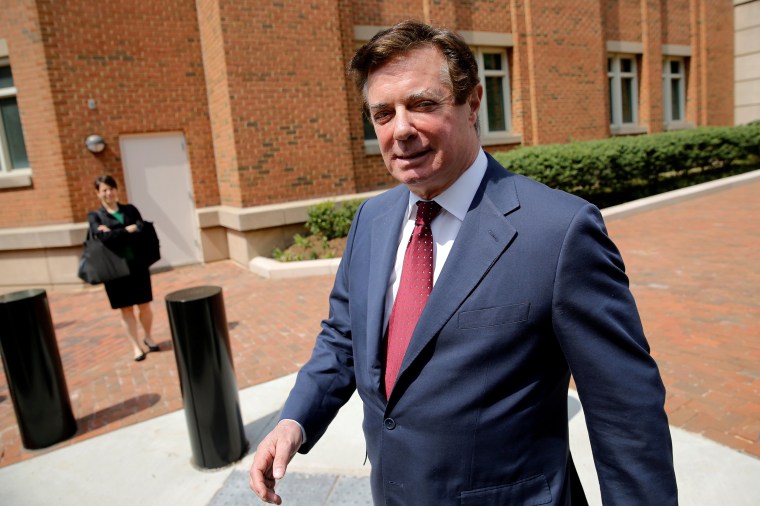WASHINGTON — Paul Manafort, President Donald Trump's former campaign chairman, could face more than a decade in prison when he is sentenced in two separate court hearings this week and next.
It's a sobering turnabout for the longtime Republican political consultant. He would have been eligible for a lighter sentence if he had adhered to a deal he made with special counsel Robert Mueller after pleading guilty in one of the two cases filed against him. Instead, the deal is off and he could spend the rest of his life in prison.
In the first charges brought by Mueller, Manafort was accused of failing to report $16.5 million in income for political consulting work on behalf of the Russian-backed government of Ukraine and its former president, Viktor Yanukovych. A jury in Alexandria, Virginia, found Manafort guilty of dodging taxes on that income and failing to report foreign lobbying. He then pleaded guilty to similar charges filed in Washington, D.C., to avoid a second trial.
The Virginia jury also convicted him of providing false information to a bank in order to get more favorable loan terms. And when he pleaded guilty in Washington, he admitted to urging some of the people involved in the Ukrainian lobbying effort to deny doing any work in the United States. When witness tampering charges were added to the Washington indictment last June, the judge overseeing the case revoked Manafort's bail. He's been held in jail since then, except to attend court proceedings.
None of the charges involved his work on the Trump campaign in 2016, and they have nothing to do with Mueller's main task as special counsel — to discover whether anyone in the U.S. was helping Russia interfere in the election.
Federal guidelines call for 19-and-a-half to 24 years in prison when he is sentenced March 7 in Virginia, though the judge is free to impose a sentence below that range. For the March 13 sentencing in Washington, federal law caps the maximum sentence at 10 years.
The most critical decision for Manafort, who turns 70 on April 1, will come in that second hearing. Judge Amy Berman Jackson must decide if he will serve the two sentences at the same time or whether they must be served consecutively. Mueller's prosecutors have so far taken no position on what the sentence should be, but they're expected to weigh in during the Washington hearing on whether the sentences should be concurrent or consecutive.
"Manafort acted for more than a decade as if he were above the law and deprived the federal government and various financial institutions of millions of dollars," Mueller's prosecutors said in their pre-sentence court filings. They called for a sentence that would "reflect the seriousness of these crimes and serve to both deter Manafort and others from engaging in such conduct."
They also said Manafort failed to truthfully answer questions from prosecutors, as he promised to do after pleading guilty to the Washington charges. He should therefore get no credit for cooperation, they said. Judge Jackson agreed that he deliberately misled members of Mueller's team.
But Manafort's lawyers said he deserves a more lenient sentence because he is a first-time offender, not the "lifelong and irredeemable felon" government prosecutors claim him to be. The convictions have already devastated him personally, professionally and financially, his defense said, and there is no need for a severe punishment to prevent him from committing future crimes.
"Given the severe damage to his professional reputation and the enormous investigative efforts of the special counsel to examine every aspect of his life, he poses no future risk to the public of re-offending." Specific deterrence for someone about to turn 70 is hardly necessary, they said.
Manafort's former business partner, Robert Gates, pleaded guilty a year ago to playing a part in hiding the money he and Manafort were paid for their lobbying work. He has since cooperated with Mueller's investigators and testified against Manafort at the Virginia trial. His sentencing has been repeatedly delayed. Prosecutors said in January that "Gates continues to cooperate with respect to several ongoing investigations."
If Manafort is hoping for a presidential pardon, the possibility that such an act might keep him out of prison was diminished by word last month that state prosecutors in New York were considering charging him with fraud. A president's pardons apply only to federal convictions, not to those in state court.
Manafort's legal saga raised some tantalizing questions but will end without providing the answers. For example, Mueller's prosecutors said Manafort shared presidential campaign polling data in 2016 with one of his former business associates, Konstantin Kilimnik — a man with ties to Russian intelligence, according to Mueller's team. But the nature of that data and why it was shared remain unclear.
Prosecutors also said that after pleading guilty, Manafort lied to them about "an extremely sensitive issue” in hopes of improving his chances of a presidential pardon. Nothing said in court documents or before the judge in open court have indicated what the issue was.


